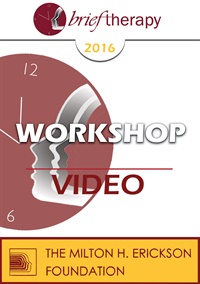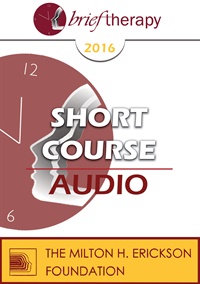
- Average Rating:
- Not yet rated
- Topic Areas:
- Short Courses | Brief Therapy | Therapist Development
- Categories:
- Brief Therapy Conference | Brief Therapy Conference 2016
- Faculty:
- Bob Bertolino, PhD
- Duration:
- 1:31:31
- Format:
- Audio Only
- Original Program Date:
- Dec 08, 2016
- Short Description:
- The purpose of this workshop is to introduce to a “renaissance” in behavioral health through series of principles drawn from research from within the field and adjacent disciplines. Participants in this session will learn how these principles and associated strategies form the foundation for effective and efficient practice.
- Price:
- $15.00 - Base Price
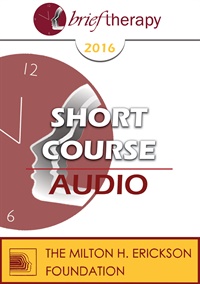
- Average Rating:
- Not yet rated
- Topic Areas:
- Short Courses | Brief Therapy | Relationships | Therapist Development | Footprinting
- Categories:
- Brief Therapy Conference | Brief Therapy Conference 2016
- Faculty:
- Susan Dowell, MSW
- Duration:
- 1:09:37
- Format:
- Audio Only
- Original Program Date:
- Dec 08, 2016
- Short Description:
- Footprintings, a dynamic new treatment approach, provides effective, easy to use tools for identifying, observing, experiencing and repairing relational perspectives between Ego States. Using color footprints chosen by the client, to diagram relationships between Parts, patients can step into different Ego States while working on clarifying and healing these internal relationships.
- Price:
- $15.00 - Base Price
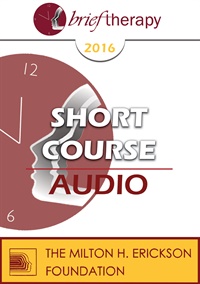
- Average Rating:
- Not yet rated
- Topic Areas:
- Short Courses | Brief Therapy | Community | Multicultural | Therapist Development
- Categories:
- Brief Therapy Conference | Brief Therapy Conference 2016
- Faculty:
- Karin Schlanger, MFT | Gloria Diaz Arnal, MFT Intern
- Duration:
- 1:11:09
- Format:
- Audio Only
- Original Program Date:
- Dec 08, 2016
- Short Description:
- Palo Alto Brief Therapy model applied in an educational context. Focus on advantages of using this approach when the context is a challenge in itself. The presenters – Ms. Schlanger is the heir to the MRI-Brief Therapy model, will bring examples illustrating a useful model when working with a diverse community.
- Price:
- $15.00 - Base Price
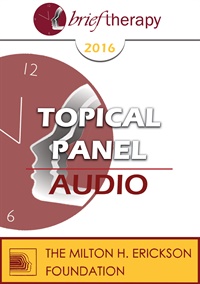
- Average Rating:
- Not yet rated
- Topic Areas:
- Topical Panels | Therapist Development | Training
- Categories:
- Brief Therapy Conference | Brief Therapy Conference 2016
- Faculty:
- Stephen Gilligan, PhD | Scott Miller, PhD | Bill O'Hanlon, MS
- Duration:
- 1:01:27
- Format:
- Audio Only
- Original Program Date:
- Dec 10, 2016
- Short Description:
- BT16 Topical Panel 3 - Training Therapists - Stephen Gilligan, Scott Miller, and Bill O’Hanlon Topical Panel on Training Therapists
- Price:
- $15.00 - Base Price
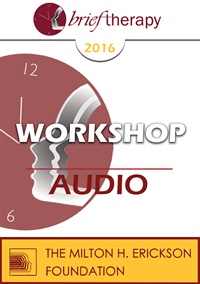
- Average Rating:
- Not yet rated
- Topic Areas:
- Workshops | Anxiety | Communication | Relationships | Therapeutic Relationship | Therapist Development
- Categories:
- Brief Therapy Conference | Brief Therapy Conference 2016
- Faculty:
- Reid Wilson, PhD
- Duration:
- 2:37:10
- Format:
- Audio Only
- Original Program Date:
- Dec 09, 2016
- Short Description:
- Taking advantage of our ever-present inner dialogue, we can help clients alter their self-talk in a way that transforms their relationship with any intimidating performance. By activating “approach” emotions and an opportunity-mindset, clients can decrease fear and improve performance. This protocol eliminates one significant step in the typical treatment process, since it is arousal congruent: clients do not need to shift their anxiety down before they step forward.
- Price:
- $15.00 - Base Price
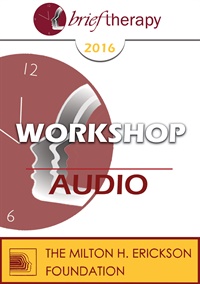
- Average Rating:
- Not yet rated
- Topic Areas:
- Workshops | Single-Session | Brief Therapy | Therapist Development
- Categories:
- Brief Therapy Conference | Brief Therapy Conference 2016
- Faculty:
- Michael Hoyt, PhD
- Duration:
- 2:03:30
- Format:
- Audio Only
- Original Program Date:
- Dec 11, 2016
- Short Description:
- BT16 Workshop 24 - Single Session Therapy: When the First Session May Be The Last - Michael Hoyt, PhDThe most common length of treatment is one session. In this workshop, guidelines will be presented for recognizing which patients are most likely to benefit from a single session and how we can provide it successfully. A structure will be presented for organizing the specific tasks and skills involved in different phases of therapy (pre-, early, middle, late, follow-through). Case examples, some on videotape, will illustrate brief therapy techniques applicable in a one-session-at-a-time therapy and in the course of longer treatments.
- Price:
- $15.00 - Base Price

- Average Rating:
- Not yet rated
- Topic Areas:
- Workshops | Brief Therapy | Therapeutic Relationship | Therapist Development
- Categories:
- Brief Therapy Conference | Brief Therapy Conference 2016
- Faculty:
- Bill O'Hanlon, MS
- Duration:
- 2:47:28
- Format:
- Audio Only
- Original Program Date:
- Dec 11, 2016
- Short Description:
- There are features that most brief therapies share. Dropping all the theoretical jargon, it becomes very simple. This presentation will provide a simple way to get therapy started on the right foot so it ends well and as quickly as possible.
- Price:
- $15.00 - Base Price
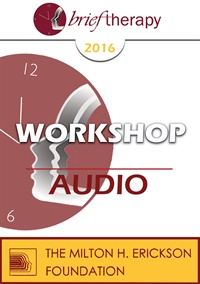
- Average Rating:
- Not yet rated
- Topic Areas:
- Workshops | Brief Therapy | Therapist Development
- Categories:
- Brief Therapy Conference | Brief Therapy Conference 2016
- Faculty:
- Wendel Ray, PhD
- Duration:
- 2:44:11
- Format:
- Audio Only
- Original Program Date:
- Dec 11, 2016
- Short Description:
- Fundamental concepts central to present-day effective systemic therapy will be described in this presentation. The connection between present day systemic therapies and research conducted during the 1950s and 1960s by the Palo Alto Group and the Mental Research Institute (MRI) will be described. Featured will be the contributions of Palo Alto Group members Gregory Bateson, Don Jackson, MD, John Weakland, Jay Haley, and William Fry. Seven specific, learnable concepts and techniques will be taught that make treatment more effective and efficient.
- Price:
- $15.00 - Base Price
- Average Rating:
- Not yet rated
- Topic Areas:
- Workshops | Brief Therapy | Interviewing | Therapist Development
- Categories:
- Brief Therapy Conference | Brief Therapy Conference 2016
- Faculty:
- Michael Yapko, PhD
- Course Levels:
- Master Degree or Higher in Health-Related Field
- Duration:
- 2:37:59
- Format:
- Audio and Video
- Original Program Date:
- Dec 11, 2016
- Short Description:
- In this workshop, we will explore the patterns of thought involved in how people make important life choices, especially those that carry the potential to really make a critical difference in their emotional wellbeing and quality of life. Instead of asking why and then theorizing why someone makes poor choices, our emphasis will be on how one decides to do this, not that, in especially vulnerable situations, i.e., those that hold great potential for causing psychological distress.
- Price:
-
Sale is $29.00
price reduced from Base Price - $59.00
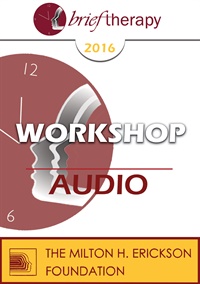
- Average Rating:
- Not yet rated
- Topic Areas:
- Workshops | Brief Therapy | Ericksonian Hypnosis and Therapy Techniques | Research | Therapist Development
- Categories:
- Brief Therapy Conference | Brief Therapy Conference 2016
- Faculty:
- Jeffrey Zeig, PhD
- Duration:
- 2:02:54
- Format:
- Audio Only
- Original Program Date:
- Dec 11, 2016
- Short Description:
- Skills and experience, research and theory ... each plays a central role in the development of effective therapy practice. And then there is something else. When we recall the work of such figures as Milton Erickson, Virginia Satir, and Carl Whitaker, we detect another layer: artistry. Surprisingly, artistry is something that can be taught, or more accurately, expanded. Everyone has the capacity. And it is artistry that brings forth all of that skill, experience, research and theory in effective and generative ways.
- Price:
- $15.00 - Base Price
Please wait ...


